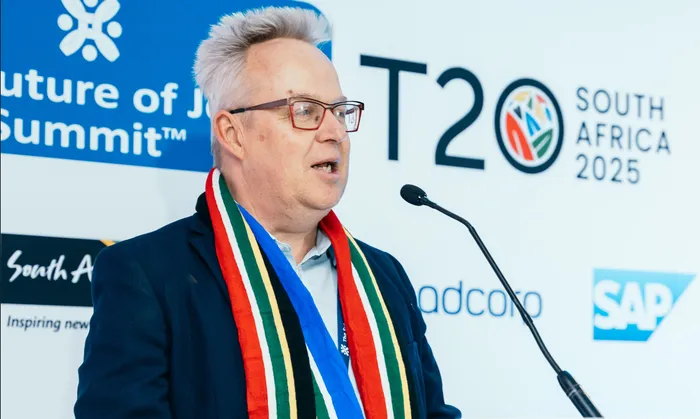
Lessons South Africa can learn from India. When India hosted the G20 in 2023, they turned the moment into a national economic accelerator, creating over a million jobs in under two years.
Image: File
In November 2025, Johannesburg will host the G20 Summit — the world’s most influential gathering of political and business leaders — alongside the second Future of Jobs Summit™. This rare convergence of global attention and local action presents South Africa with a once-in-a-generation opportunity: to commit to and co-create one million new jobs by 2030.
The idea is not unprecedented. When India hosted the G20 in 2023, they turned the moment into a national economic accelerator, creating over a million jobs in under two years through targeted industry investment, fast-tracked infrastructure, and SME empowerment.
South Africa can follow — and even surpass — this example if we act decisively, align our national priorities, and work in true partnership across business, government, and labour.
The Power of Co-Creation
Co-creation is not a slogan. It’s a disciplined process where all key stakeholders come together to solve challenges that none can fix alone. We’ve seen it work here before. The 2010 FIFA World Cup united sectors to deliver the highest visitor satisfaction rating in tournament history and generated thousands of jobs. The lesson is clear: big, complex goals require big, collective action.
From G20 to the Future of Jobs Summit
The Inaugural Future of Jobs Summit™ hosted in May this year proved that South Africa’s job creation potential is real — but only when partnerships are deliberate and structured. CEOs, policymakers, and labour leaders identified practical ways to generate large-scale employment, from turning township manufacturing hubs into export engines to harnessing AI for mass upskilling.
This year’s Future of Jobs Summit, taking place on 7 November 2025 in Johannesburg, will coincide with the G20 plenary summit held two weeks later, creating a powerful platform to announce, launch, and scale job creation projects to both a domestic and international audience.
Launching the Future Works Initiative™
At the heart of the 2025 Future of Jobs Summit™ will be the launch of the Future Works Initiative — a national platform designed to turn commitments into collaborative, measurable projects.
The initiative will:
Modelled partly on India’s G20 job creation strategy, the Future Works Initiative™ aims to move South Africa from talk to tangible, trackable action.
The 2030 Jobs Target and the Next10 Opportunity
The one million jobs target can be achieved by positioning South Africa as a global leader in the 10 industries of the future through the Summit’s Next10™ Framework:
These are high-multiplier industries with proven capacity to generate large numbers of sustainable jobs. Aligning business investment, government incentives, and skills pipelines to each of these sectors can position South Africa as a G20 innovation and employment leader.
Three Strategic Shifts for Success
Why 2030 Matters
2030 is more than a date on the calendar — it’s the milestone by which South Africa must prove to its youth and to the world that inclusive economic growth is possible. Achieving the one million jobs target will mean more families with incomes, more entrepreneurs building businesses, and a nation confident in its future.
A Collective Commitment
The Future of Jobs Summit™ is not just an event; it is a commitment platform. On 7 November, during the G20 month, South Africa can send a powerful signal: that we are not only participating in the global economy but shaping it.
India’s G20 legacy shows what is possible. Our own history proves we have the talent, will, and capacity. Through the Future Works Initiative™ and the Next10 Framework, we can transform opportunity into reality. The choice is ours: another decade of missed opportunities, or a 2030 defined by shared prosperity.
India’s Million Jobs Playbook: Lessons for South Africa
When India hosted the G20 in 2023, they treated the summit not as a diplomatic gathering, but as a national economic accelerator. The results were extraordinary — over one million new jobs were created in under two years. Here’s how they did it, and what South Africa can adapt.
1 Targeted Industry Investment
India focused on sectors with high employment multipliers: renewable energy, logistics, tourism, manufacturing, and digital services.
Lesson for SA: Use the Next10 Framework to channel investment into future-defining industries where we have competitive advantages.
2 Infrastructure Fast-Track
Large-scale transport, energy, and urban development projects were accelerated with special regulatory approvals.
Lesson for SA: Government can commit to “G20 Fast Lanes” for catalytic projects — reducing approval times from years to months.
3 SME & Startup Empowerment
India launched G20-linked funding windows, pairing global investors with local entrepreneurs.
Lesson for SA: Create a Future Works Venture Fund to back SMEs in high-growth sectors with blended finance and market access.
4 Skills-to-Jobs Alignment
Vocational training was directly tied to specific job offers, especially in green tech and digital.
Lesson for SA: Expand partnerships between business, SETAs, and universities to deliver job-ready training for Next10 industries.
5 Global Market Linkages
India used G20 to open new trade corridors, particularly in Africa and the Middle East.
Lesson for SA: Position the 2025 G20 Summit as a launchpad for export deals in agribusiness, green hydrogen, and creative industries.

Dr Nik Eberl is the Founder & Executive Chair: The Future of Jobs Summit™ (Official T20 Side Event) .He will be writing a regular column in Business Report.
Image: Supplied
Dr Nik Eberl is the founder and executive chair: The Future of Jobs Summit™ (Official T20 Side Event). He is the author of Nation of Champions: How South Africa won the World Cup of Destination Branding
BUSINESS REPORT
Related Topics: